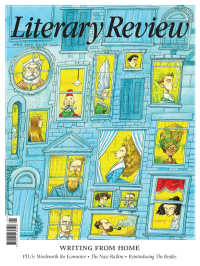Louise Foxcroft
Cruel Intentions
Strange Antics: A History of Seduction
By Clement Knox
William Collins 516pp £25
This rollicking account of a chaotic, cruel and dispiriting history opens with a 19th-century seduction case in which an older, apparently respectable man exploited and impregnated a fifteen-year-old girl in his care (the girl’s reputation, as in so many similar instances, was trashed). This is seduction as crime rather than desirous play, a public concern touching on questions of morality, philosophy, politics, class, race, gender and economics. It’s more than disheartening to realise how little has changed.
Clement Knox argues for an idea of seduction that emerged in the 18th century with the rise of ‘modernity’. Ovid, Christine de Pizan, Chaucer, Shakespeare et al are considered intellectually apart, distanced from us by post-Enlightenment ideas of liberalism, materialism and feminism. The seduction narrative fundamentally changed as passion and logic collided, creating two modern, intertwined forms: the ‘Villainous’, based on the exploitation of vulnerability, and the ‘Heroic’, relying on the power of reason and sensuality. The tension between these two forms is presented in a series of biographies that explore the difficult ‘grey zone of agency’.
By exposing such notorious rakes as Francis Charteris and his associates, Knox argues, William Hogarth in A Harlot’s Progress and Samuel Richardson in Pamela and Clarissa codified and popularised the modern concern with seduction, sparking a revolution in socio-sexual behaviours and attitudes. Charteris, whose ‘capacity for roguery’ was legendary, legged

Sign Up to our newsletter
Receive free articles, highlights from the archive, news, details of prizes, and much more.@Lit_Review
Follow Literary Review on Twitter
Twitter Feed
Alfred, Lord Tennyson is practically a byword for old-fashioned Victorian grandeur, rarely pictured without a cravat and a serious beard.
Seamus Perry tries to picture him as a younger man.
Seamus Perry - Before the Beard
Seamus Perry: Before the Beard - The Boundless Deep: Young Tennyson, Science, and the Crisis of Belief by Richard Holmes
literaryreview.co.uk
Novelist Muriel Spark had a tongue that could produce both sugar and poison. It’s no surprise, then, that her letters make for a brilliant read.
@claire_harman considers some of the most entertaining.
Claire Harman - Fighting Words
Claire Harman: Fighting Words - The Letters of Muriel Spark, Volume 1: 1944-1963 by Dan Gunn
literaryreview.co.uk
Of all the articles I’ve published in recent years, this is *by far* my favourite.
✍️ On childhood, memory, and the sea - for @Lit_Review :
https://literaryreview.co.uk/flotsam-and-jetsam